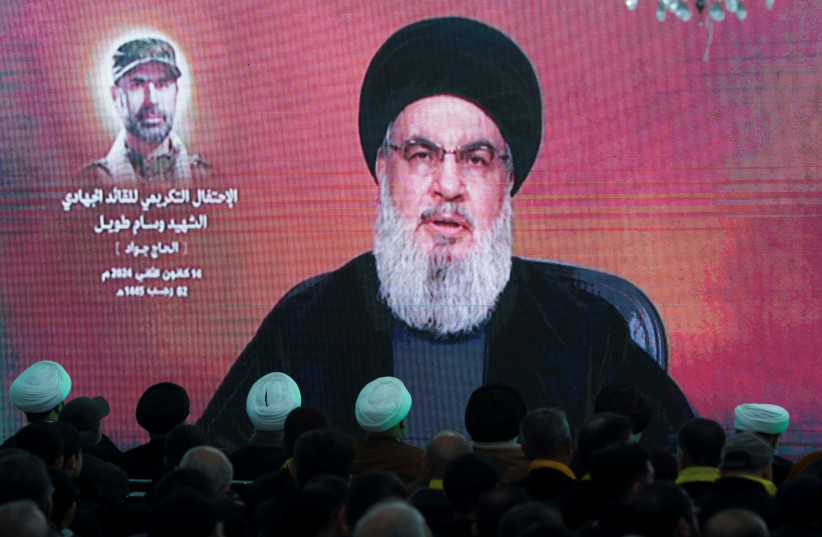Until now, the conventional wisdom has been that the main dilemma with Hezbollah and its resolution come down to whether Israel can convince Hezbollah to withdraw most of its forces to the Litani River through diplomacy or whether a fuller war will be needed to do this.
The follow-up question would then be how long Israel gives to diplomacy before it goes to war with Hezbollah. Signs are that any major operation would be at least months away.
This would also leave the tens of thousands of northern residents evacuated from their homes in October away from home for an indefinite period.

Maybe the northern residents could come back much sooner without a deal and without a full war.
How?
How could Israel's northern residents possibly return?
The Post understands that the crucial elements of this arrangement would be:
- Keeping two full IDF divisions on the northern border indefinitely, doubling the number of troops of the single division which was there before October 7.
- Continuing regular IDF attacks on Hezbollah forces south of the Litani which the Post has reported have so far cleared around 75% of the Radwan special forces from the area and 85-95% of the lookout towers.
- Reaching a deal with Hezbollah which at least ends the rocket and anti-tank fire while continuing the diplomatic talks for a more permanent ceasefire.
- Encouraging the northern residents to return to their homes based on all of these changed conditions – most importantly the two divisions which remove the invasion danger.
- Massive economic incentives to compensate for all losses and to encourage returning home.
This would require that the political echelon give an honest accounting to northern residents of what has been accomplished, what can be realistically accomplished in the coming months, and what the nation is unwilling to do in the coming months, that is to go to all-out war with Hezbollah.)
The reason that the Post understands that top defense officials may be unwilling to go to a full war with Hezbollah even in half a year (though they are not saying it out loud), is that the war in Gaza will not be over.
The IDF has tremendous achievements to its credit in Gaza tactically. It has full operational control of northern Gaza, the heart of Hamas’s former rule. It is moving toward operational control of central Gaza and Khan Yunis.
Once Khan Yunis falls, the last of Hamas’s tough battalions will have been taken apart.
Rocket fire from Gaza has plummeted on some days to single digits and some days pass with no rockets at all.
Around 220 IDF soldiers have fallen compared to the 500-1,000 which were predicted in 2014 if a similar operation had been undertaken.
But Hamas is far from dismantled. The rocket fire has not stopped completely. If the IDF does not continue with constant low-intensity conflict operations, and with a heavy force complement the terror group could bounce back.
This means that not only large Israeli forces, but also significant Israeli attention will need to remain focused on Gaza to finish the job of paving the way for non-Hamas rule there.
US, EU, and Arab-allied support is also needed to stabilize Gaza going forward.
Starting a war with Hezbollah before that process is near completion could lead to a devastating counter-strike by Hezbollah and undermine allied support for “The Day After.” It could draw needed troops and attention away from Hamas.
Another honest statement by defense or political officials might be to tell northern residents that: even if Hezbollah was as ready as Hamas before October 7 to attack Israel, and even if applying the “concept” of deterrence to Hezbollah Chief Hassan Nasrallah before October 7 was as wrong as it was with Hamas Chief Yahya Sinwar, now that Nasrallah has seen what the IDF has done to Gaza and facing two full IDF divisions on the border – he actually is deterred.
The failure to deter Sinwar one time, does not mean deterrence never works, and cannot work with Nasrallah. Until this war, Sinwar also was never hit as hard as Nasrallah in 2006.
None of this would comfort northern residents who much prefer a promise that 100% of Hezbollah will be beyond the Litani and that living on the northern border will never entail any risk ever again. That or to say that the country is revving up for a full war with Hezbollah to solve all of its security issues all at once.
But given how much progress the IDF has already made with Hezbollah and with additional deterrence enhanced by the IDF’s dominance in Gaza, doubling the number of troops, may convince the northern residents to return home sooner rather than later.
